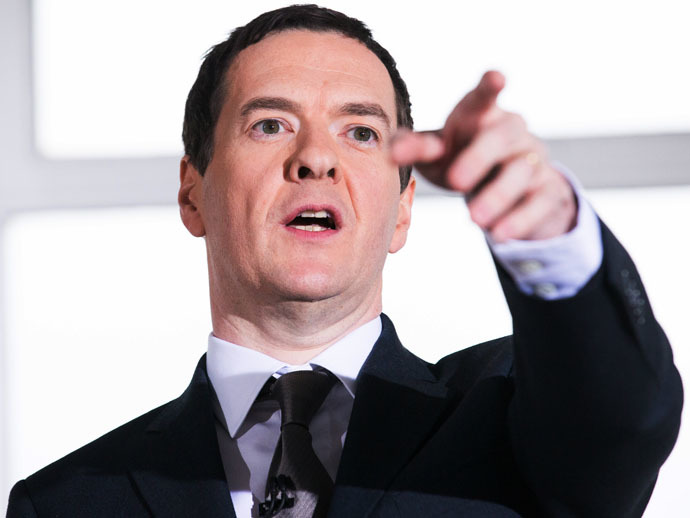UK austerity is irrational but here to stay – anti-cuts economists

The strategy of slashing budget deficits amid sluggish economic growth has been questioned by the International Monetary Fund and swathes of economists worldwide. But Brits will likely face austerity irrespective of who wins May’s general election.
“On the fundamental issue of austerity, there is remarkably little to choose between the Conservatives and Labour,” according to James Meadway, a senior economist at the New Economics Foundation (NEF).
The Conservatives’ 5-year economic plan for Britain implies a “shocking” contraction “in public spending to 1930s levels,” he told RT.
Meadway, whose work at NEF focuses on progressive responses to the recession and austerity, says Labour’s proposed economic policies are somewhat less severe than those of the Conservatives.
But he argues Shadow Chancellor Ed Balls’ pledge to reduce the state’s debt burden could devolve into more aggressive cuts if Labour wins the general election.
Austerity as social engineering
Critics say Osborne is more than an austerity hawk. He seeks to complete the work Margaret Thatcher began by rolling back the state's socio-economic structures, they argue.
Many claim such draconian measures amount to social engineering.
Should Brits sanction a further five years of austerity by voting the Tories back into power, Osborne’s long-term economic plan will reach completion.
But even if the Conservatives lose, political analysts argue the Chancellor will claim a victory of sorts. Osborne has shifted the political compass of debate so far to the right that a Labour government could not abandon the austerity agenda in the next parliament, they argue.
Gordon Brown’s economic policies in the early phase of Tony Blair’s premiership provide insight into what Labour austerity might look like, according to Meadway.

Brown, while Chancellor in the Blair government, strived to adhere to the Conservatives’ spending limits during this period.
Meadway suggests increased taxes “skewed towards the wealthy,”“politically unpopular”spending cuts, and further measures to balance the budget are likely if Miliband’s party is elected in May.
UK economist Michael Burke told RT further austerity in the next parliament would be irrational, and would compound the state’s economic turmoil.
“If Labour implements austerity it will look like the other social democratic parties in Europe that have done the same,” he said.
“It would not be rational to repeat that in Britain and to expect a different outcome.”
Labour, led by Ed Miliband, is currently the main obstacle to a Conservative victory in the general election.
Impact of austerity in Britain
The People’s Assembly Against Austerity has recently sought to debunk a series of myths it warns obscure the impacts of austerity.
While the government suggests current economic policies are creating employment and prosperity for the many, the campaign group argues most UK residents are experiencing the most serious decline in basic living standards since records first began in 1856.
It also strongly challenges the government’s claim that austerity has been successful, warning the nation’s budget deficit has ballooned 10 percent over the past year to £100 billion.
The People’s Assembly refutes the government’s argument that Brits collectively face difficult economic times. It says the wealth of Britain’s 1,000 richest individuals has doubled since the financial crisis, while average pay has plummeted annually since 2008.
Burke, who supports the People’s Assembly, warns the next government must take steps to address Britain’s economic crisis.
“The crisis in the British economy remains an investment strike by the private sector, which the Coalition has deepened by cutting government investment,” he said.
“If there is no plan to increase government investment the crisis won't end. Cuts in other areas of spending will in fact make it worse.”

While Britain opted for austerity in the aftermath of the 2008 financial crisis, America employed a Keynesian route out of crisis. The specifics of the US and UK recessions differed. But contrasting outcomes of the policies employed were telling.
Austerity in Britain created stagnation, marginal growth and a looming deficit that remained extremely high. Keynesian policies, meanwhile, sparked more rapid growth in the US, and a lowered deficit.
Meadway warns the British economy is both unstable and volatile.
“The economy, although currently growing, is massively burdened by household and financial sector debt, has a growing current account deficit, and faces a world economy that is hugely more uncertain than that of the late 1990s,” he said.
“The UK is particularly exposed to a further financial crisis, which would derail any party’s current economic plans.”
The doctrine of fiscal rectitude has been contested by economists across the globe. But Britain appears devoted to an austerity agenda irrespective of who is in the driving seat or what the social costs are.












